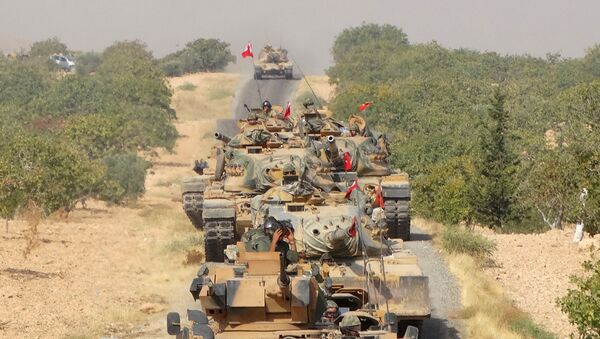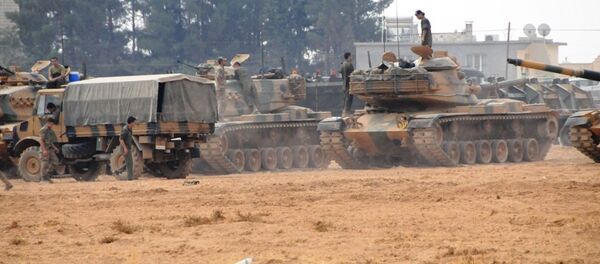The operation backed by a US-led coalition started on August 24. The stated goal of Operation Euphrates Shield, as the campaign is formally known, was to cleanse the area of Daesh and prevent Kurdish forces from advancing further west.
The incursion involved Turkish special forces and tanks, as well as some 5,000 Free Syrian Army fighters crossing into Syria and take the town of Jarablus under control.
Before the operation started, fierce clashes between the Syrian Army and the Kurdish People’s Protection Units (YPS) took place in Hasakah. The way Damascus is seeing situation in northern Syria is connected with the Hasakah events, Levent noted.
"The Syrian government sees that Syrian Kurdish forces are in a very close partnership with Washington. Some say that in order to maintain their presence in the region the Americans promised to help the Kurds with their autonomous state. Finally, Damascus agreed on a Turkish operation in Jarablus. This was a signal to the Kurds – if you’re not with us you will be attacked by Turkey, and the US won’t come to help," Levent said.
Moreover, Ankara tried to invade Syria under different pretexts since 2011 and even tried to involve its NATO allies. Now, it seems that Damascus finally agreed on a Turkish offensive in northern Syria, according to Levent.
"However, this is a very dangerous situation for Ankara. If Turkish forces and opposition groups further advance in Syria they will be dragged in a number of clashes. Thus, Ankara will need help, maybe from Russia or the Syrian government," she suggested.
Levent also commented on media reports that Ankara and Damascus are engaged in talks to restore relations.
"Such talks previously took place in Algeria and Jordan. However, the Syrian government doesn’t see the negotiations as a way to restore ties. Over the past five years, Ankara and Damascus have had so many differences and mutual resentments so it would be impossible to return to normal ties in the short-run," she said.
Commenting on the Turkish operation Jarablus, the journalist suggested that one of the goals of the operation is providing support for militants groups entrapped by the Syrian Army in Aleppo.
According to her, in fact armed groups backed by Turkey in Syria are not part of the so-called Free Syrian Army (FSA).
"Those groups comprise jihadists or those supporting jihadists. Their combat capabilities are in question. If Turkish forces rely on those groups and advance in Syria they could be left face-to-face with Daesh militants," the journalist said.
"Another danger for Turkey is that Ankara-backed militant groups may be engaged in clashes with Syrian forces, for example, in Aleppo. Thus, if Turkey wants to stay in Syria Turkish forces will not be able to avoid confrontation with the Syrian Army," she concluded.



